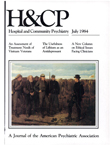The Clinical Usefulness of Lithium as an Antidepressant
Abstract
Much attention has been directed toward the use of lithium in bi-polar depressive illness (manicdepressive illness), but fewer studies have evaluated lithium's efficacy in unipolar depressive disorders. This paper critically reviews the literature dealing with the use of lithium for the treatment of acute unipolar depression as well asfor prophylaxis against future depressive episodes. Differences in study design, entry criteria, serum lithium level, dose, patient population, and diagnosis are highlighted; these variations help explain some of the controversy surrounding the use of lithium in unipolar depression. The available information indicates that lithium should be seriously considered as an effective alternative for the treatment of unipolar depression when other antidepressant medications are ineffective or contraindicated.
Access content
To read the fulltext, please use one of the options below to sign in or purchase access.- Personal login
- Institutional Login
- Sign in via OpenAthens
- Register for access
-
Please login/register if you wish to pair your device and check access availability.
Not a subscriber?
PsychiatryOnline subscription options offer access to the DSM-5 library, books, journals, CME, and patient resources. This all-in-one virtual library provides psychiatrists and mental health professionals with key resources for diagnosis, treatment, research, and professional development.
Need more help? PsychiatryOnline Customer Service may be reached by emailing [email protected] or by calling 800-368-5777 (in the U.S.) or 703-907-7322 (outside the U.S.).



